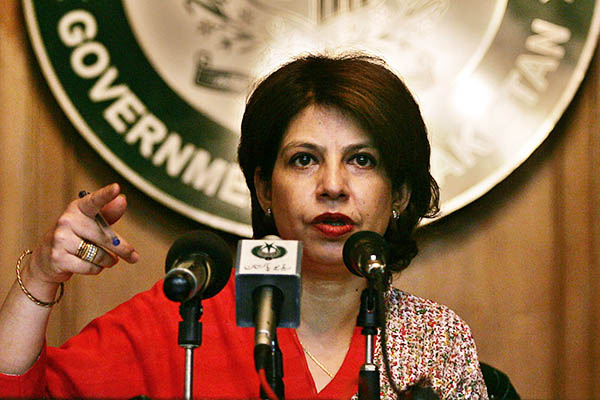
Former Ministry of Foreign Affairs spokesperson Tasnim Aslam. Aamir Qureshi—AFP
Former diplomat Tasneem Aslam’s criticism of Nawaz Sharif reflects the mindset that prevents normalization of ties between Pakistan and India
Tasneem Aslam, a former Pakistani diplomat who was the spokesperson of the Ministry of Foreign Affairs of Pakistan in 2011, has claimed in an interview with a journalist on YouTube that “ex-prime minister Nawaz Sharif had barred the foreign ministry from speaking against India and death-row convict Kulbhushan Jadhav as part of the policy of going soft on New Delhi.” Then she surmised that Sharif was probably pro-India because he had some personal business links there and for that reason “he was personally close to Indian Prime Minister Narendra Modi.” She said that when Nawaz Sharif attended the oath-taking ceremony of Modi in 2014, “he did not meet Kashmiri Hurriyat (freedom) leaders,” and that his “pro-India policies did not benefit Pakistan.”
Earlier, after Sharif was ousted for being “soft on India” in 1999, Aslam worked as FO spokesperson during the tenure of military ruler General Pervez Musharraf, who apparently didn’t bother her too much even as the general currently faces a death sentence. He, too, tried the soft-on-India line but got nowhere. And she probably thinks that the punitive “gray area” in which the Financial Action Task Force (FATF) has placed Pakistan is not a reprimand for Islamabad’s frontloading foreign policy with jihad against India.
It’s not a fire-breathing jihadi male but a female normally expected to pursue strategic thinking rather than ideology; she is a woman who is determined to prove Jung wrong when he wrote: “Men live on the basis of concepts which are pure and non-negotiable, often leading to war; women live on the basis of relationships, subject to fluctuation, but negotiable and reparable.” (Today the global order tends to the prescriptively feminine even as many states prefer being masculine.)
Now in retirement but full of ambition, Aslam probably wants Prime Minister Imran Khan’s attention, forgetting that he began his tenure by sending a “soft message” to Narendra Modi. She is definitely not inclined to the discourse of diplomacy and thinks condemnation of India in the international arena will somehow make India cower and cough up Kashmir and cover Islamabad with glory. Unfortunately, Khan is experiencing the failure of her India line after getting a cold shoulder from the Saudi-dominated Organization for Islamic Cooperation.
But she is on firmer ground than the two governments—that of the PPP and rhe PMLN—that were ousted for being “soft on India.” The India-centrism of this thinking is backed by an almost universal resistance in Pakistan to any changes in the anti-India curriculum of textbooks. The resistance is not only from the bent mind of the state machinery but also to the mind which would not remove its nexus with the non-state actors it used in the past and was to use again after 2014.
She should remember that Nawaz Sharif had campaigned in the 2013 election with two contradictory slogans, opening up to India and peace with Taliban. (Aslam should have taken note of his popular mandate). Of course he dropped the India part earlier “by raising the issue of Kashmir at the U.N.” but embraced the Taliban part by criticizing America’s drone attacks against them.
One can’t blame Aslam for thinking the way she doers even after the infamous Kargil war, which was not unleashed by Nawaz Sharif. That’s the way Pakistan’s foreshortened mind works. To shoo elected governments away from India, a Defense of Pakistan Council was created that attacked any “pro-India” gesture while long-marching on the Lahore-Islamabad highway showing financial muscle through Hafiz Saeed envied by fellow-clerics dominating the Council. Rascally FATF has caused Hafiz Saeed to be incarcerated and no longer fears any Mumbai attack of 2008 that had shaken India and “taught her a lesson.”
Some scholars think that it was the textbook India-centrism of Pakistan that finally brought it to Islamic extremism. The myth of India not accepting Pakistan and India attacking Pakistan was concocted and survives the acquisition of nuclear deterrence by Pakistan. Pakistan used jihad in the “asymmetric war” the world calls cross-border terrorism; it used the “mosque” to muster the warriors it needed to sharpen its revisionist irredentism which actually ended up destroying Pakistan from within.
Nawaz Sharif, like President Zardari before him and his earlier ousted PPP government, thought normalization of relations with India was the only available solvent to the fateful “jihadi” consensus. He desired survival of Pakistan through change of policy in light of the theory of gradual adjustment to circumstances.
Not even its friendship with China is able to wean Pakistan from its India obsession. Pakistan was supposed to be aware of the life-changing project it was embarked on with the Chinese trade route through Pakistan. Two gas pipelines were waiting on its western border to enter it and go to India. Afghanistan wanted a two-way trade corridor to India through Pakistan. China wanted India to join its trade route in Pakistan to facilitate the $100 billion worth of trade it is doing with India. Dangerously isolated, Pakistan was being reminded again and again of its “median state” status if it wanted to prosper.
Ex-foreign secretary Riaz Muhammad Khan wrote in 2014: “Pakistan’s repeated offers to China and Central Asians to use the Karachi port have evoked little interest and the Quadripartite Agreement signed in 1995 (Pakistan, China, Kyrgyzstan and Kazakhstan) remains moribund. Thus, the potential of trade corridors through Pakistan depends on engaging Afghanistan and India.” But minds such as Tasneem Aslams’ will not allow this potential to materialize.
